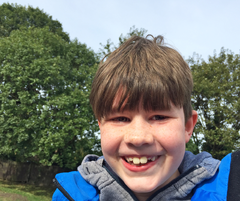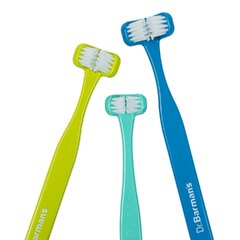Yes, an autistic person may face challenges such as sensory sensitivities to certain textures, tastes, or sounds associated with brushing and dental visits. They may also have difficulty communicating discomfort or understanding the importance of oral hygiene.
An autistic person may develop common habits that can harm their teeth, like:
Teeth Grinding Tongue Thrusting
Scratching Gums Biting Lips
Some may have eating habits like pocketing food in their cheeks or chewing non-food items like gravel or pens, which can contribute to damaging teeth. An autistic person may have a higher risk of tooth decay, especially if they eat sticky, sweet foods or find tooth brushing challenging.
Maintaining good oral health is crucial for overall health and well-being. Poor oral hygiene can lead to tooth decay, gum disease, and other health complications that may impact eating, speaking, and quality of life.
 Dental visits can be stressful because of sensory factors like bright lights, strange noises, unusual smells, busy waiting areas and new faces to meet.
Dental visits can be stressful because of sensory factors like bright lights, strange noises, unusual smells, busy waiting areas and new faces to meet.
Preparing for a Dental Visit with Your Child
- Communicate with the Dental Team: Share your child’s unique sensitivities and preferences with the dental team before the appointment.
- Schedule a Trial Visit: Arrange a trial visit to help your child get familiar with the dental environment and meet the staff.
- Practice at Home: Role-play the dental visit by simulating sitting in a chair, opening the mouth, and other steps of the routine. This can make the experience feel less unfamiliar.
- Share What Works Best: Inform the dental team of strategies or tools that help calm or engage your child.
- Set Realistic Expectations: Understand that building comfort and trust takes time. Regular visits can establish a routine, but each child progresses at their own pace.
- Break Up Treatments: Spread procedures over multiple visits if necessary to reduce stress and create positive experiences.
- Use Visual Aids: Create or use a step-by-step visual guide or social story, such as “Tom Goes to the Dentist,” to help your child understand what to expect.
- Bring Comfort Items: Take along a favourite toy, blanket, or other comforting item to the visit.
- Incorporate Relaxation Aids: If appropriate, let your child listen to music or use distractions like games, phones, or tablets during the appointment. Discuss these options with the dental team to ensure a smooth visit.

Every child is wonderfully unique. For autistic children personalised oral care is important and traditional dental advice might need to change to fit their unique needs.
- Gradually introduce oral hygiene tools (toothbrush and toothpaste) to build familiarity.
- Allow your child to choose their toothbrush or toothpaste to give them a sense of control.
- Try different brushing times to find what works best. Brushing at bedtime and one other time of the day if possible.
- Help your child understand when the tooth brushing task will end by playing a favourite song or using an egg timer.
- If your child needs help with tooth brushing, stand behind your child with their head against your chest or have them on your lap, with a pillow for support.
- Use pictures or videos to show each step.
- Brushing together can make the routine clearer.
- Remember to give lots of praise and encouragement.
There are many toothpastes to choose from, like non-mint flavours, unflavoured, and non-foaming e.g. Oranurse; especially for those who are hypersensitive. These are available online and in some pharmacies. You can try different ones and pick the one that works best for you. Your toothpaste should contain fluoride (1450ppm - check the toothpaste label) as fluo

ride helps keep your teeth strong. If you have toothdecay, your dentist might prescribe higher fluoride toothpaste.
There are techniques to help people who have difficulties with dexterity, strength and muscle memory. You can insert your toothbrush inside a slit tennis ball, foam tube or handle bar grip. Speak to your dental team or check google for ideas.
There are also products available such as the TePe Extra Grip which help those with reduced manual strength and dexterity make the most of their toothbrushing. These are available to buy online.
A specialised toothbrush is a double or triple-sided toothbrush which cleans all sides of teeth at the same time making it easier and quicker to bru sh your teeth. This can be very helpful for those who do not like toothbrushing or find it difficult.
sh your teeth. This can be very helpful for those who do not like toothbrushing or find it difficult.
Examples of specialised toothbrushes are Dr Barman's Superbrush or Collis Curve. These toothbrushes can be found online and in some pharmacies.
The DHF online shop currently stocks the Dr Barman Superbrush here.
There are many good toothbrushes available. Try different kinds, colours and designs and choose the most suitable one for you or your child.
Manual Toothbrush
Choose a small-headed, soft-bristled toothbrush. If you finds it tricky to hold, ask your dental team how to make the handle easier to grip.
Electric Toothbrush
Electric or battery-powered toothbrushes can be game-changers for those who struggle with manual brushes. Their rotating heads are very good at removing plaque. Some people might not love the feeling or noise, but others might find it fascinating particularly if they are hyposensitive. It can help them get used to different sensations for their dental visits.
Specialised Toothbrush
Double and triple-sided toothbrushes are a great option and available online or in some pharmacies. They help to clean all tooth surfaces at once, making brushing time quicker and easier for those who find tooth brushing difficult, e.g. Collis Curve or Dr. Barman’s Superbrush.